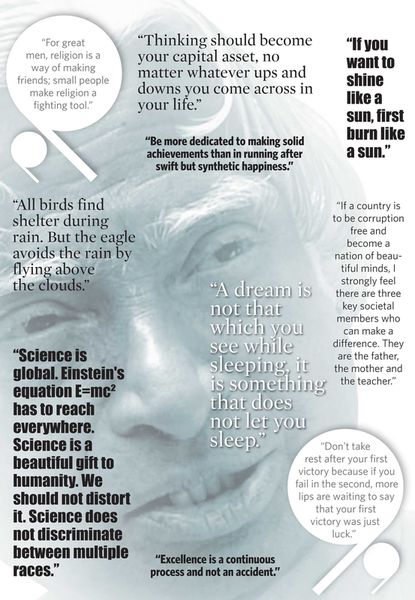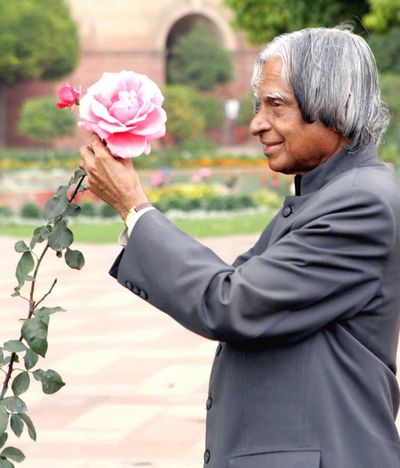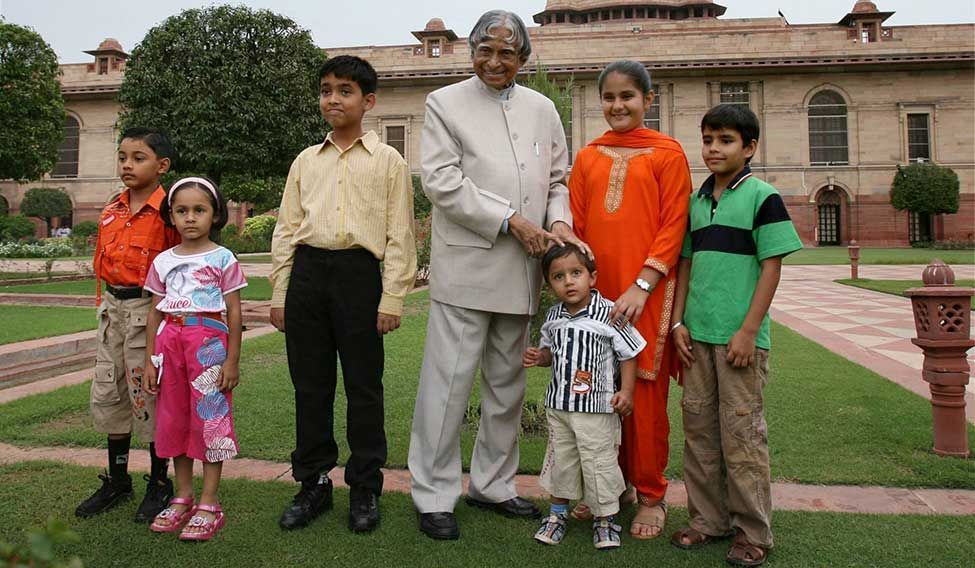Even before social media came into vogue, A.P.J Abdul Kalam was one of its practitioners. He had welcomed the 21st century with a personal pledge to connect with a million children and launched his own vision of what India should become in 2020. His whirlwind tours and long string of engagements every day had more followers than most of the celebrity social media accounts. And the five years he spent in the Rashtrapati Bhavan transformed not only the presidency, but the man himself.
Kalam opened the gates of the sprawling Rashtrapati Bhavan like no other president before or after him. He wanted children from all over the country to visit the 340-room house and the fabled Mughal Gardens. Whenever he had time, he would surprise groups of children by walking to them from his ground floor office and chatting with them. He ensured that every child returned with pleasant memories and a small memento.
The president hosts a reception on the lawns of the Mughal Gardens on Independence Day and Republic Day, which is attended by the vice president, prime minister, ministers, MPs, judges, diplomats, top bureaucrats and senior Army officers, apart from renowned artistes and media persons. The first such reception hosted by Kalam was to be held three weeks after he assumed office on July 25, 2002. He studied the guest list and asked why ordinary people were not invited. When the officials said only those of the rank of additional secretary and above were invited, Kalam ordered that henceforth, a group of ordinary workers should be invited to every reception. Thus, 40 postmen and postwomen were invited. Next time, it was the turn of municipal workers.
Despite being deeply spiritual, Kalam did not want to host an iftaar party. Instead, he gifted food to inmates of orphanages in and around Delhi, that, too, by paying from his own pocket. Tales of his simplicity and originality abound at the Rashtrapati Bhavan even eight years after he left. Asked whether he would miss the late morning walks in the Mughal Gardens, he said the garden was in his memory and he did not have to be greedy about being physically present there.

Within a month of his assumption of office, the message had clearly gone down that the staid protocols had to be reworked to make the president easily accessible. Kalam had announced that there would be a lot of changes along with continuity in his presidency. He was equal to the task of handling complex political issues, though he was extremely saddened on two occasions. The first was in 2005, when he signed an order placing the Bihar assembly under suspended animation while on a visit to Moscow. He had been told by the government that the governor, Buta Singh, had recommended that no government could be formed in the state, and that the Union cabinet headed by prime minister Manmohan Singh had endorsed that report. But when the opposition made an issue that the Samata Party-BJP combine was denied a chance to form the government, he was upset. The matter went to the Supreme Court, which rebuked the governor in strong terms. But there were no adverse remarks against the president. Kalam had told his staff that he would resign if his conduct was found to be wrong.
The second issue was in 2006, when the Manmohan Singh government got a bill passed in Parliament to amend the Office of Profit Act, following the controversy that Sonia Gandhi had violated the act by accepting the chairmanship of the National Advisory Council, a position with cabinet rank. Kalam resisted the demand of the government to sign the amendment into law and relented only when his suggestion that offices of profit should not be given freely to MPs was accepted. He was sad that the government failed to stick to the commitment, because of pressure from most political parties.
Another controversy surfaced in 2004 that Kalam was reluctant to swear in Sonia Gandhi as prime minister, despite her being elected leader by the Congress Parliamentary Party and supported by other parties which became part of the United Progressive Alliance. The rumours got strengthened when Sonia declined the post and instead chose Manmohan Singh. Even after demitting office, Kalam did not want to discuss the issue in detail, saying too much was being made of the episode. Despite his campaign for openness and transparency, Kalam believed that many things in the government should remain a secret. He had a charming way of fending off curious questions from the media and had an extra-ordinary talent for diverting attention during conversations.
Kalam, who had been part of the national security strategy team, also was a natural supreme commander of the armed forces, and he took special interest in the welfare of the troops and the advancement of military technology. He led by example as he flew the advanced Sukhoi jet fighter, travelled in a submarine and rode an Arjun tank. The tank had been designed by the Defence Research and Development Organisation when he headed it. He travelled to the remotest outposts of the Army, including the Siachen glacier. He counselled prime ministers Atal Bihari Vajpayee and Manmohan Singh on security and high technology issues. He supported Singh on the civil nuclear deal with the United States as president when it was signed, and as former president when the left parties withdrew support in 2008. In fact, it was his advice which made the Samajwadi Party led by Mulayam Singh Yadav save the UPA government.
 The former president looks at an exotic rose in the Rashtrapati Bhavan's Mughal Gardens—the true-blue tech wizard was a nature lover, too | AP
The former president looks at an exotic rose in the Rashtrapati Bhavan's Mughal Gardens—the true-blue tech wizard was a nature lover, too | AP
The Constitution says Parliament consists of the president, the Lok Sabha and the Rajya Sabha. This made Kalam take special interest in not only the two houses, but also the state assemblies. He went to great lengths to prepare vision documents for various states and presented these documents to the state legislatures. But his task did not end there. He would check with chief ministers on how much of the agenda was implemented. Kalam was not a politician by profession, but he knew how to handle politics. He had been interested in a second term as president, but only if there was consensus in his favour. He allowed speculation to mount in 2007 and when he realised that the Congress did not want another term for him, he announced that he would not be a candidate.
Though he had not travelled much as a scientist and technologist because of the sensitive nature of the high technology areas in space and defence departments that he was in charge of, Kalam handled foreign affairs well, observing diplomatic niceties and sometimes springing surprises. As his secretary of five years, P.M. Nair, noted in his memoirs, he once engaged Pakistan president Pervez Musharraf with a presentation on his pet scheme, Providing Urban Facilities in Rural Areas (PURA), so that the general could not get into a detailed discussion on defence and foreign policy issues.
When he visited Africa, he found that the facilities for higher education and health care on the continent did not match the requirements. One night in Dar es Salaam, Tanzania, he came up with the idea of providing tele-education and telemedicine to all 54 countries on the continent through a dedicated satellite, which would beam exclusive programmes to classrooms and hospitals in each country. His vision was a satellite donated by India, along with uplinking centres in each country so that the satellite sent down programmes prepared both in India and that country. Converting the thought into action took a few hours as he asked G. Madhavan Nair, chairman of Indian Space Research Organisation, whether the idea could be implemented and then got the clearance from Manmohan Singh. Before his term ended, Kalam had the satisfaction of seeing the Africa satellite, donated by India, beaming down programmes to ten African countries.
Kalam was a president who showed how to make high constitutional principles people-centric.














